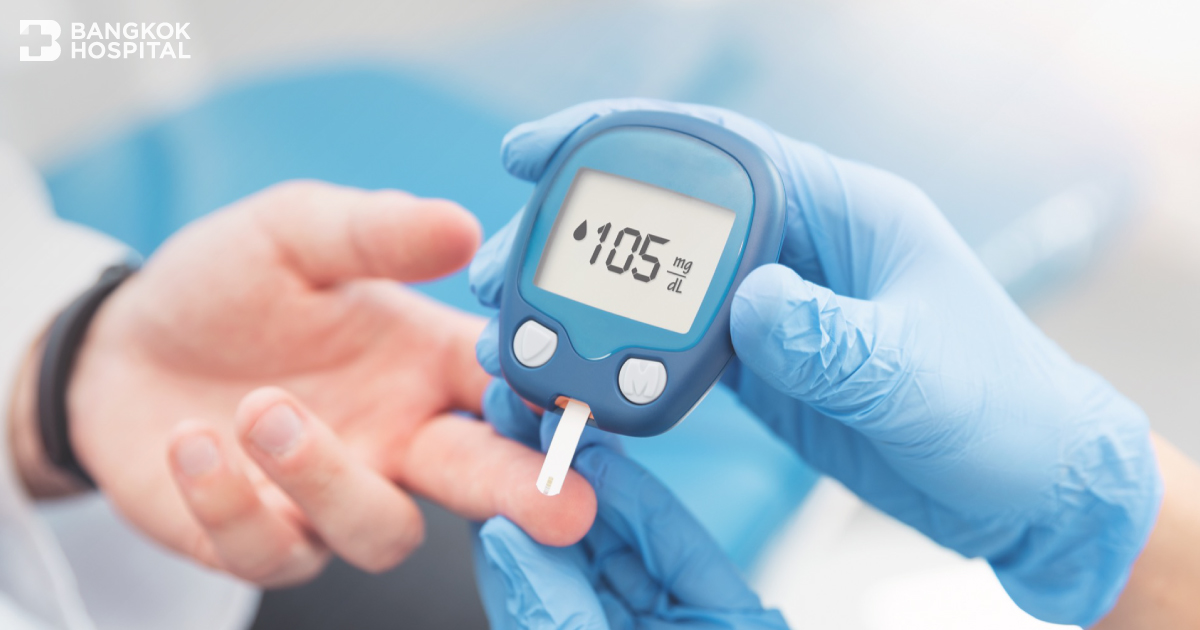Myth 1: Eating high-sugar foods causes diabetes
Truth: There are 2 types of diabetes: Type 1 Diabetes is caused by genetic factors, and the exact cause is not yet known, leading to the pancreas being unable to produce insulin. Type 2 Diabetes is caused by genetic factors and lifestyle behaviors, resulting in the body’s insufficient insulin production for its needs or insulin resistance. Consuming high-sugar foods over a long period can be a contributing factor to developing diabetes if the body cannot produce enough insulin. Additionally, foods high in saturated fat can affect insulin’s efficacy, hindering blood sugar control.
Myth 2: Diabetes is a disease of the elderly
Truth: Diabetes can occur at any age, depending on the causes and factors that contribute to the development of the disease. Type 1 Diabetes mostly occurs in children or young people, while Type 2 Diabetes mostly occurs in people aged 45 and above. However, nowadays, Type 2 Diabetes is increasingly found in younger individuals.
Myth 3: People with diabetes know when their blood sugar is low
Truth: Symptoms of low blood sugar include dizziness, weakness, cold skin, sweating, trembling, rapid heartbeat, dry mouth. Not everyone will have symptoms when experiencing low blood sugar, and symptoms can vary between individuals. It is important to check blood sugar levels when symptoms occur or when suspected of having low blood sugar and address it immediately, as hypoglycemia can lead to shock or death.
Myth 4: Diabetes is not a serious disease; many people have it
Truth: Diabetes causes approximately 20,000 deaths in Thailand each year. Additionally, diabetes is associated with other diseases such as high blood pressure, heart disease, and it has been found that individuals with both heart disease and diabetes are nearly twice as likely to suffer a heart attack or sudden cardiac arrest compared to those without diabetes. Moreover, poor diabetes control can lead to severe complications, such as blindness, skin infections, and nerve damage.
Myth 5: If you have diabetes, you must not eat sweets or foods high in sugar
Truth: Because high blood sugar levels can lead to diabetes, most people think they should avoid sugary or high-sugar foods. However, consuming nutritious foods in appropriate proportions along with exercise means that eating fruits or sweets is still possible but should not be excessive.
Myth 6: If you have diabetes, you cannot donate blood
Truth: People with diabetes can donate blood if their blood sugar levels are within normal range and they do not have diabetes complications. However, this is subject to further evaluation by the blood donation staff.
Myth 7: Diabetes is a disease of overweight people
Truth: Both overweight and thin people can develop diabetes because it is caused by several factors, including genetics, lifestyle behaviors, consuming high-calorie and high-sugar foods, lack of exercise, stress, and insufficient rest. While obesity is a risk factor due to dietary habits and research showing that many obese people have normal or higher-than-normal insulin levels, their body cells may exhibit insulin resistance.
Myth 8: If no one in your family has diabetes, you won’t get it
Truth: Genetic factors are one of several factors contributing to Type 2 Diabetes. Even if no one in your family has diabetes, you can still develop it with inappropriate lifestyle behaviors.
Myth 9: If you have to take insulin injections for diabetes, it means your condition is severe
Truth: The goal of treating diabetes is to control blood sugar levels to prevent complications. If diet, exercise, and oral medications do not control blood sugar well, insulin injections may be necessary.
Myth 10: If you have diabetes, you must treat it with insulin
Truth: Type 2 Diabetes can be prevented and controlled through a nutritious diet in proper proportions, exercise, and medications. Insulin might be used if blood sugar levels cannot be controlled to the desired level. For Type 1 Diabetes, due to genetic and immune system factors affecting insulin production, treatment primarily involves insulin injections.












